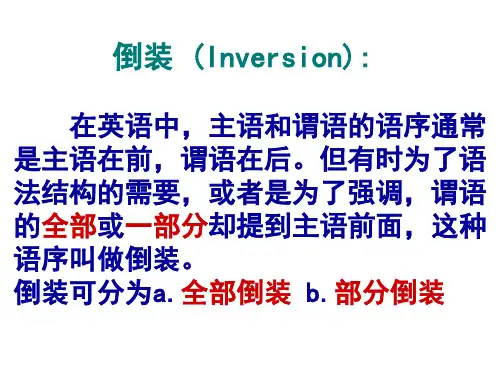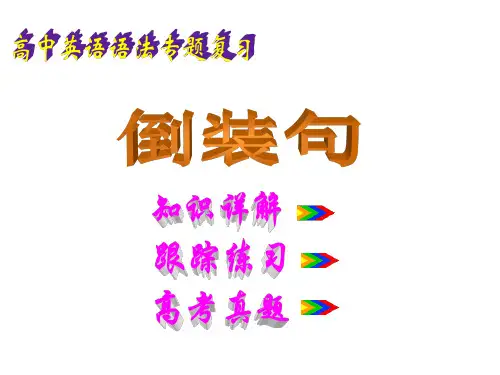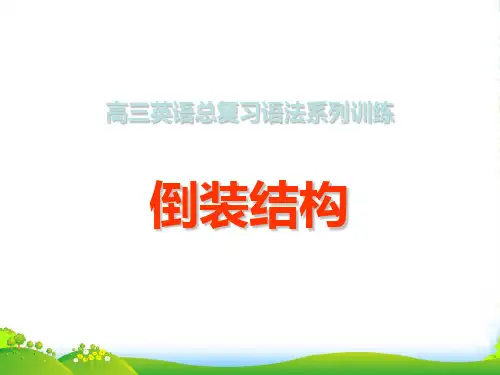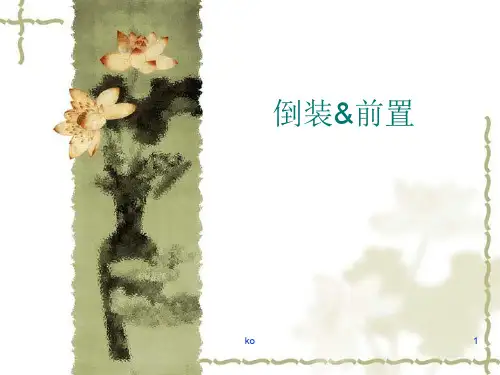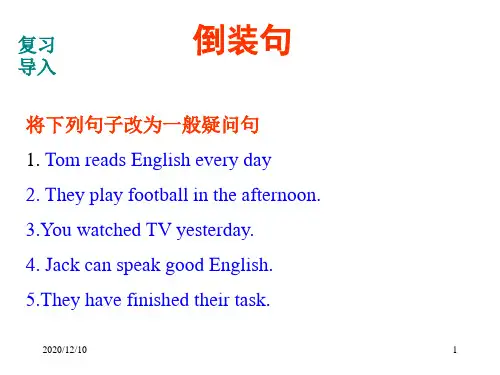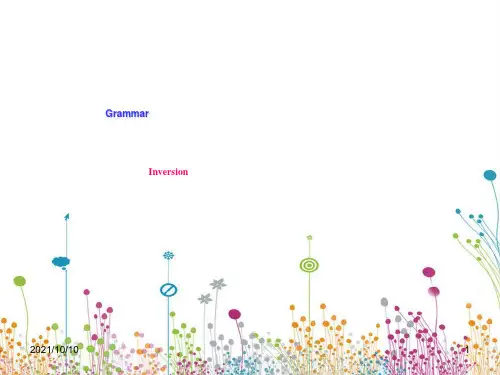- 1、下载文档前请自行甄别文档内容的完整性,平台不提供额外的编辑、内容补充、找答案等附加服务。
- 2、"仅部分预览"的文档,不可在线预览部分如存在完整性等问题,可反馈申请退款(可完整预览的文档不适用该条件!)。
- 3、如文档侵犯您的权益,请联系客服反馈,我们会尽快为您处理(人工客服工作时间:9:00-18:30)。
2)Nearby were the canoes in which they had come to the island.
5.主语太长,表语太短,为了平衡句子结构的 需要,将表语提前。 (全部倒装)
1. Inside the pyramid are the burial rooms for the kings and queens. 2. Gone are the days when we are enslaved. 3. Present at the meeting are ten famous writers. 4. Among the children was an old man. such和be连用作表语时,也常用倒装语序,如:
yesterday.
• 2)Now comes your turn to sweep the floor. • 注意:主语是人称代词时,仍用自然语序。
1. Away they went. (=They went away.)
3.直接引语的一部分或全部放在句首时,有时用倒装。 (全部倒装) “What’s up, Tom?” asked Mother.
-- I don't know, __பைடு நூலகம்__.
A. nor don't I care
B. nor do I care
C. I don't care neither D. I don't care also
注意:若只是表示对前面所述内容的肯定,确认, 主谓不倒装 Tom asked me to go to play football and so I did. “It's raining hard.” “So it is.”
2.用于省略if的虚拟条件从句中,should / were / had 被放在句首。(部分倒装) 1)Had I not adopted my class teacher’s advice, I would have made such a serious mistake. 2)Were she you, she would tell her parents the truth. 3) Should I earn money, I should live better.
1. Such was not his intention. 2. Such are the facts.
二、 部 分 倒 装
把助动词,连系动词或情态动词 放在主语之前
1.用于疑问句。(部分倒装) Shall everything be ready before you arrive? What can I do for you? 注意:疑问词做主语或修饰主语时,主谓不颠倒. Who can work it out? How many students have read this book?
“The car is mine,” said Tom. 注意:主语是代词时,不倒装。 “The car is mine,” he said. 4.为了平衡句子结构的需要,或为了强调状语(常为介词 短语),或为了使上下文紧密衔接时,将状语提前 (全部倒装)
1)They arrived at a farmhouse, in front of which sat a small boy.
一、 全 部 倒 装
(谓语全部放在主语之前)
此结构通常只用与一般现在时和一般过去时
1.there be句型, 其中be动词有时可exist, live, stand, lie, seem, appear,remain, happen 等 词代替(全部倒装)
• There is an experienced teacher and many lovely students in the classroom.
1) 2) There lay a winding brook in front of an old house.
2.方位词in, out, there, here, inside, outside, up, down, away, off, downstairs, upstairs等以及now, then放在句首时,谓语动词常用be, come, go, lie, run等,并且句子的主语是名词。(全部倒装) • 1 ) Away flew the bird which I bought
4. 含有否定意义的副词或连词置于句首,如hardly, rarely, seldom, scarcely, barely, never, not, few, little, neither, nor, not only, hardly…when, in no case, by no means, no sooner…than, many a time, often 等。 (部分倒装) 1)Not until the 19th century was the written examination probably known. 2)Not only was everything he had taken away from,
3、so, as, neither, nor, no more 位于句首,表示前面的
情况也适合于另一人或物时。(部分倒装)
Tom can speak French. So can Jack.
If you won't go, neither will I.
-- Do you know Jim quarrelled with his brother?
倒装结构 inversion
英语句子的自然语序是“主语 + 谓语”。 如果将谓语的全部或一部分放在主语之前,这 种语序被称为“倒装”。谓语全部放在主语之 前,为全部倒装;只把助动词,连系动词或情 态动词放在主语之前,为部分倒装。
倒装的原因,一是语法结构的需要 (如某些疑问句);二是为了强调; 三是保持句子的平衡或是上下文紧密相接。
